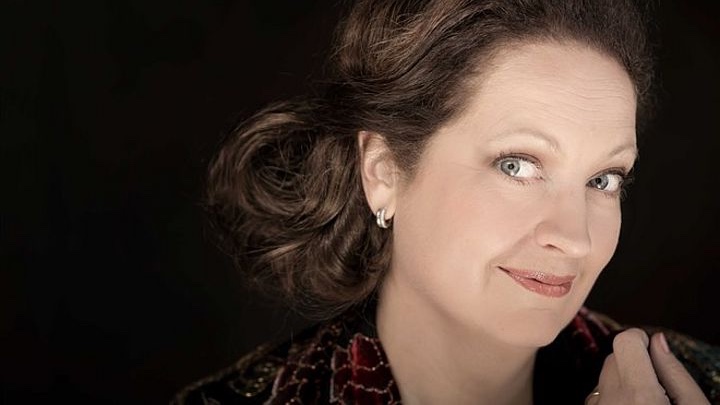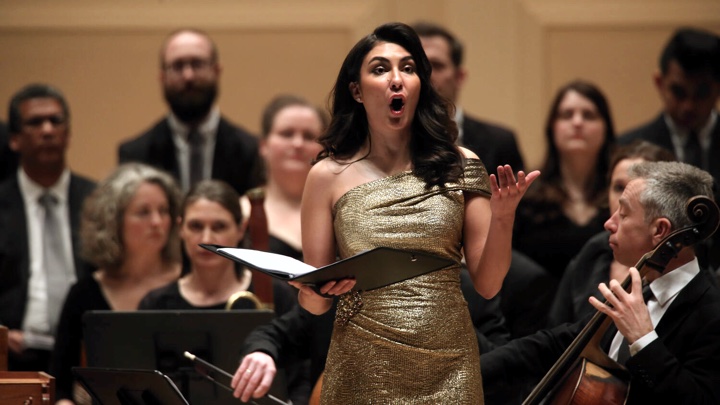
“Nope, it’s a woman. And she’s pretty, too. Look at the picture,” responded her friend.
The exchange echoed in my head as subtitles introduced the oratorio as “Soloman,” a typo that probably earned some intern a strong talking-to.
There’s nothing unusual about casting a woman in Solomon’s titular role. In fact, Handel wrote it for the mezzo-soprano Caterina Galli.
The reason, Sir John Elliot Gardiner posits, as quoted in the program notes, is that, “In this particular work, Handel wanted to achieve a neutrality for the central character.”
“To have had Solomon sung by a castrato,” continues Gardiner, “wouldn’t have been quite right, as castrati were generally associated with fictitious operatic heroes, often tyrants or thwarted lovers.”
“George II,” for whom Handel wrote Solomon, “wouldn’t perhaps have thanked him for that.”
Still, when Ann Hallenberg strode in, wearing black slacks and heels, and sang, “Almighty pow’r who rul’st the earth and skies,” which starts low in her tessitura, there was a moment of gender confusion.
And amidst the “bravas” that followed her honey-sweet aria, “What though I trace each herb and flower,” I swear I heard a couple of “bravos.”
Not to mention, when soprano Miah Persson sang, “Bless’d the day when I was led/ to ascend the nuptial bed…/on my bosom as he lay” there was something, dare I say, queer about it.
“My king!” sang Persson. “My queen!” returned Hallenberg, followed by an air about “am’rous turtles.”
With Harry Bicket conducting from harpsichord, the English Concert certainly showed its range. From the muscly cellos in the overture, to such softness in the “Nightingale Chorus,” with chittering flutes and violin. The Clarion Choir sounded almost over-caffeinated in “Ye hearts and cymbals sound.”
And for those saying period orchestras can’t be loud, the English Concert proved them wrong in Act II. As the chorus sang “Happy, happy Solomon,” the strings produced stomach-dropping harmonies, enriched by jovial percussion and brass.
But the highlight of this act was the scene with the two harlots (sung by Persson and mezzo-soprano Niamh O’Sullivan).O’Sullivan was believably unlikeable, singing, “false is all her melting tale.” She was icy in demeanor, but warm in tone.
In this scene, Solomon’s just jurisdiction — “divide the babe” — determines the true mother.
Other than this, Solomon has little plot. But amidst the female-heavy, pastoral arias, tenor James Way’s characterful voice stood out in “See the palm that lifts the head.”
The “Arrival of the Queen of Sheba,” which opened Act III, settled into brisk tempo. When soprano Elena Villalón sashayed in, wearing a golden gown, she exuded stage presence.
In the numbers the followed — which are really just Handel showing off — “Rouse us next to martial deed” actually jerked me awake.
Hallenberg singing, “Leeeeeengthen out the solemn air,” led into the Chorus of Israelites, whose refrains of “Full of death and wild despair” were made even more heart wrenching by unexpectedly major moments and loud silences.
I wanted the cello to sound more, well, rolling in “Thus rolling surges…” but enjoyed Brandon Cedel’s rumbly baritone in “May your name resound in story.”
Three and half hours later (I kept thinking how, without endpins, the cellists’ legs must be tired), we arrived at the no-holds-barred “Praise the Lord,” which has echoes of the Hallelujah chorus.
“Jesus!” exclaimed the patron behind me. No, I thought, Solomon.
Concert photos: Steve J. Sherman





